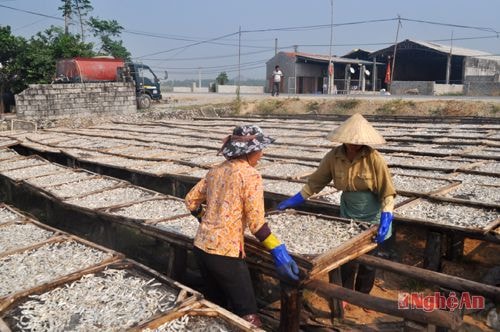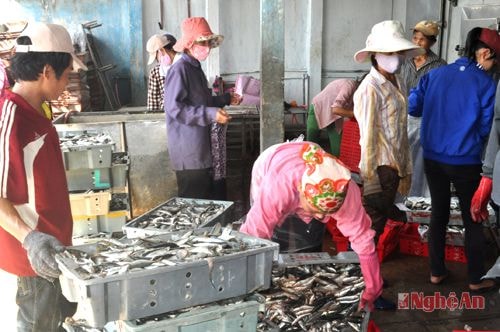Combining exploitation with seafood processing
(Baonghean) - This season, in Quynh Di and Quynh Lap (Hoang Mai Town), trays of steamed and dried fish stretch along the road towards the sea. These are anchovies collected for steaming and drying or making fish sauce to increase the value of the marine exploitation profession.
Since the introduction of the drying and steaming profession to the area, the amount of anchovies consumed by fishermen in Quynh Di Ward and Quynh Lap Commune has been stable, and the value of the sea fishing profession has also increased significantly. Originating from Phuong Mai Enterprise, which brought the new profession from the South to their hometown, people learned and expanded the profession. Up to now, in Quynh Di Ward, there are 7 establishments for drying fish for export to the Chinese market and domestic consumption. Anchovies and mackerel are steamed by the establishments, then dried in the sun, dried, and stored in cold storage for sale all year round, with a constant supply to the market.
Mr. Tran Van Son, Phu Loi 1 block, Quynh Di ward, said that he used to go to sea, each trip back from the sea he harvested a lot of fish but it was very difficult to sell, the price was low, his boat often had to bring all kinds of fish to Thanh Hoa to sell, incurring additional transportation costs, the income was not enough. He decided to provide a collection service, then make fish sauce to bring to the southern provinces for consumption. In 2009, Mr. Son continued to switch to the business of steaming and drying anchovies and mackerel, each time the fish arrived, his family's facility had to hire 20 more workers. Fresh fish here are put in the oven to be steamed, dried, packaged and stored in cold storage waiting for traders to buy. Mr. Son shared: "Since the establishment of drying facilities, the purchase price of raw fish for fishermen has increased quite high, currently 13,000 VND/kg, people are very excited. Our facility purchases and processes more than 200 tons of raw fish each year, producing 60 tons of finished dried fish, selling at 40,000 VND/kg of dried fish, bringing in a total revenue of 2.4 billion VND/year. However, the biggest difficulty now is that the facilities lack production space, currently having to rent land from people to dry fish...".
 |
| Drying anchovies in Quynh Di ward (Hoang Mai town). |
The family of Ms. Tran Thi Hoai, Tan Dong block, Quynh Di ward has also participated in the fish drying business since 2012. The young couple dares to think, dares to do, boldly invests in a spacious and spacious production facility, creating seasonal jobs for dozens of local workers. Ms. Hoai said that her family's processing facility collects and processes more than 150 tons of fresh fish each year, all anchovies caught by fishermen are collected, not only purchased in Quynh Di area, but also purchased from Quynh Lap, Quynh Tien, Quynh Nghia and Thanh Hoa, Ha Tinh, Quang Binh provinces... to have enough raw materials to meet market demand.
Quynh Di Ward has Phu Loi 1 and Phu Loi 2 blocks specializing in marine seafood exploitation, with nearly 90 exploitation vehicles, annual exploitation output from 2,300 - 2,600 tons, serving the fish sauce processing and drying and steaming profession. Thanks to the strong development of seafood processing in the ward, the value of local marine exploitation has been increased, creating more jobs and increasing income equally for the labor force, improving people's lives. Mr. Nguyen Quang Dai, Chairman of Quynh Di Ward People's Committee said: Every year, Quynh Di fishermen exploit about 2,500 tons of anchovies, when there was no steaming furnace, it was mainly used to process fish sauce, the surplus anchovies could not be consumed, so they had to be sold at a low price. After the steaming and drying processing facilities were established, the value of anchovy products has been increased; at the same time, creating jobs for hundreds of female workers in the area...
 |
| Trash fish is prepared by Cua Lo people to export to China through unofficial channels. |
Along with Quynh Di, in recent years, Quynh Lap commune has also strongly developed the steamed and dried fish processing industry. Up to now, there are 5 large-scale steamed and dried fish processing facilities in the area, processing an average of 3,000 tons of fresh fish each year. All of the steamed and dried fish output is sold to the Chinese market. The good news is that instead of staying at home waiting for their husbands to come back from sea to sell fish, many women in the commune now have extra jobs from steamed and dried fish processing facilities. Those who work full days have an income of 5 million VND/month, the lowest level is 3.5 million VND/month. Thanks to the synchronous development from exploitation to processing, the socio-economic development in the area has been promoted rapidly and comprehensively, and people's lives have been significantly improved. People have the conditions to invest in building many new large-capacity fishing boats to go offshore for long periods of time, both bringing back to the mainland an increased fish output and going offshore to protect the sovereignty of the sea and islands of the Fatherland.
Mr. Hoang Ngoc Thuy, Deputy Head of the Economic Department of Hoang Mai Town, commented: The development of the fish drying profession in the area has contributed to diversifying the traditional processed products of the marine industry, meeting the diverse consumption needs of customers, increasing the income value of fishermen. Especially the role of consuming products for the fishing industry, especially in the bumper fish seasons, when mackerel and anchovies are abundantly available at the fishing port and cannot be consumed, the establishment of drying establishments has taken on the task of consuming products for the fishermen, ensuring stable income for fishermen, increasing profits for processing establishments, and creating many jobs for local workers. In 2014, the output of dried fish processed by Hoang Mai Town alone reached more than 2,000 tons; it is estimated that in the first 6 months of 2015, the output of dried fish processing by Hoang Mai Town reached 1,312 tons. All steamed and dried products are well consumed, bringing in a large revenue for processing facilities and contributing to the local budget.
Quynh Lan






